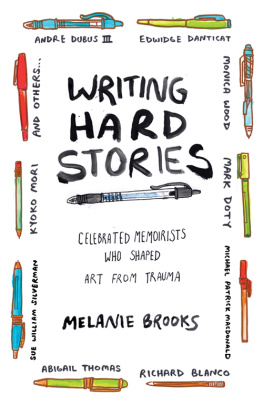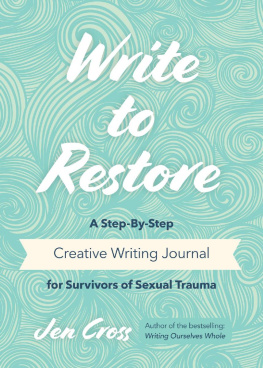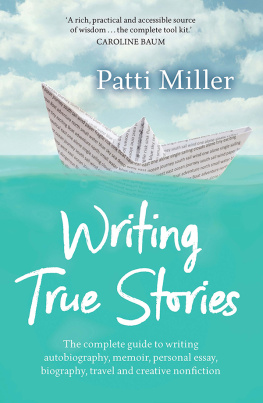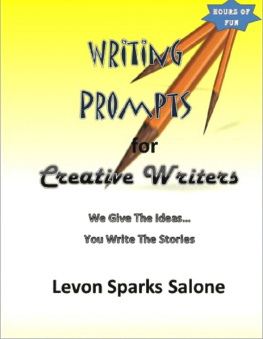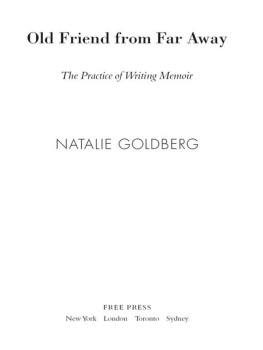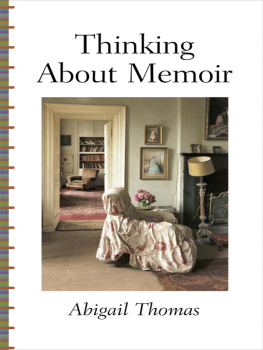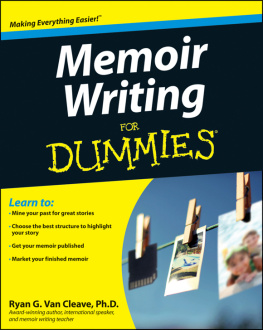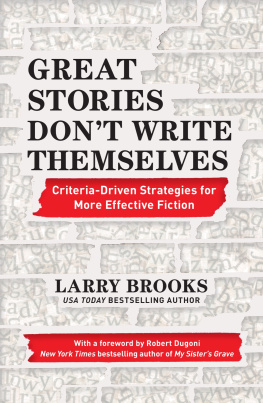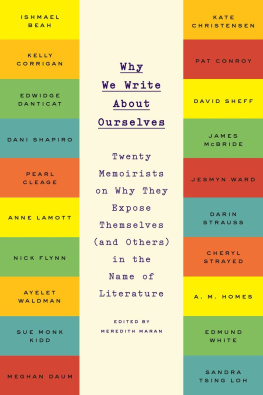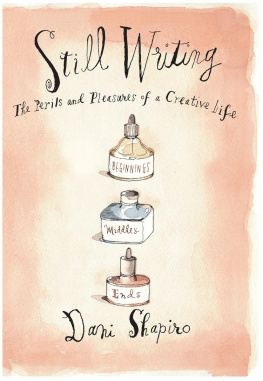
For Chris, you are my companion through lifes hardest and best parts
For Will and Lily, you are the best parts
And for all those with difficult stories to tell, you are not alone
Introduction
Near the beginning of my master of fine arts degree, a friend introduced me to a fellow student while we sat waiting for a faculty presentation to begin.
Whats your genre? he asked.
Creative nonfiction, I replied.
So I guess youll write about your father and then cry, he said.
I could see he was joking. He didnt strike me as a mean guy. But I was new to this writing program scene. Uncertain about whether I belonged or not. Whether the story I had to tell, which was about my father and often did make me cry, could adequately compare to the work around me. His glib remark tore into all of my deepest insecurities.
I guess so, I said trying to keep my voice steady and turning away before he could see the unwanted tears that stung my eyes.
Without intending to, this guy had initiated me to an undercurrent that Ive discovered is not uncommon in literary circles and workshop settings: a discomfort with the very real emotion that underlies writing about sensitive subject matter.
Its a discomfort that leads some workshop facilitators to stop conversations about the actual content of student pieces with words like Lets keep our focus on craft here. A discomfort that has made me, on more than one occasion, feel ashamed of the tears that sometimes surface with discussion of my work and jokingly label myself The Crier to put others at ease when theyre confronted by my pain. A discomfort that gave one woman in a workshop the audacity to say, in a tone so beyond pretentious I cant find a word for it, The question you want to ask yourself is Am I just simply writing in my journal or am I trying to create literature?
This idea that somehow emotionally charged, often traumatic personal stories presented as nonfiction are masquerading as literature has accompanied the recent evolution of the memoir genre. Its also what compels many authors to qualify their work as literary memoir, so as not to be lumped in with what New York Times book critic Neil Genzlinger calls this absurdly bloated genre or what his counterpart, Michiko Kakutani, claims is propelled by the belief that confession is therapeutic and therapy is redemptive and redemption somehow equals art.
And its an idea that has so often left me alone to flounder in the psychological turmoil and vulnerability of revisiting the grief and hurt and confusion of my own hard story, because people habitually back away from this inevitable offshoot of doing the kind of writing that requires us to dig deep. I needed to find the people whod be willing to step closer.
So, on a day in March 2013, when several inches of freshly fallen snow blanket Bostons streets, I feel a little claustrophobic because of the press of people crowding the front tables of the large conference room inside the John B. Hynes Veterans Memorial Convention Center. In a throng of other eager and hopeful writers attending this particular session at the annual conference for the Association of Writers and Writing Programs (AWP), I wait for my turn to speak to author and poet Kim Stafford. My mind tumbles over the question I am poised to ask. Jostled forward, I meet Staffords expectant gaze at the same time that an unexpected nervousness floods my body. My palms feel clammy, my throat tight. I dont give myself time to think before I blurt out, How did you do it?
As soon as the rush of words leaves my lips and I see Staffords jaw tighten before his face softens into a patient and teacherly expression, I realize my mistake. He thinks I am asking him about craft. The question Id prepared in my head had morphed into those dreaded words most published writers loathe to hear. The ones that ask for the formula to literary success.
Just keep doing the work, he says, his kind eyes crinkling at the corners. Keep drawing on the tools you have and do the work. Before I can reboot my brain and self-correct, Ive lost not only Staffords attention but also my space in line. The people behind bump me to the side. Disappointment washes over me. Utterly deflated, I step through the wide door into a hallway crammed with moving bodies and raucous chatter.
Id asked the completely wrong question.
I am midway through the first semester of my MFA, a newbie to this conference where twelve-thousand-plus authors, teachers, students, publishers, editors, and agents meander and mingle in the hallways; travel up and down the escalators in a never-ending human stream to attend readings, panels, and keynote addresses; and wander around with an equal mixture of euphoria and terror at the sheer magnitude of this gathering of creative people.
Its Day 2 of the four-day conference, and I have yet to be initiated to the number-one rule of these kinds of events: pace yourself. Im at the brink of physical and mental exhaustion after attending seven pretty intense panel presentations, and feel that at any moment I might collapse into a weepy heap on the floor.
The letdown of my missed opportunity with Kim Stafford isnt helping.
The description of Staffords panel, Writing Past the End, in the three-hundred-page AWP program that weighs down my bag, caught my attention with these words: In this panel we look squarely at paralyzing stories that must be told. The writer tilts the mirror to see inside a hidden life and embrace the dark [... ] seeking grace through story in spite of all.
For two months, Ive been trying to write my way into my piece of a family story that has pushed to be heard for years. When I was thirteen years old, my father, a distinguished general and thoracic surgeon, was infected with HIV from a contaminated blood transfusion while undergoing open-heart surgery. The year was 1985, and ignorance and hysteria about AIDS were at their height. In Canada, where we lived, rumors swirled about publicly identifying and quarantining AIDS patients and their families. Believing he had only months of his life left and afraid of the stigma of this disease, my father decided to keep his illness a secret. No one imagined he would live another ten years. But he did. And for ten years, through my adolescence and early adulthood, the secret of his disease and the specter of catastrophe that inevitably loomed ahead defined my life.
Journeying honestly into this hard story and unearthing the ongoing grief of losing my dad to AIDS in 1995 has been agonizing. And terrifying. And, more often than not, paralyzing.
The panelistsKim Stafford, Gregory Orr, Nan Cuba, and Jill Bialoskyhad all written books that enter the aftermath of losing a sibling to either suicide or violent death. They shared their stories of bringing their traumas to the page, and all spoke directly to the feelings of fear and risk and vulnerability inherent in the process. But it was Stafford, in particular, who described his experience writing his memoir, One Hundred Tricks Every Boy Can Do: How My Brother Disappeared, as setting down a difficult burden whose story I felt most drawn to.
Stafford had written an essay, How a Book Can Set You Free, about what it felt like to get the galley copy of his memoir in the mail. With a slight tremble in his voice, Stafford read a passage from the essay: I cried for him as I read. He caught me. But his story was no longer a stone harnessed to my heart. My heart was not carrying him any more. I had been released from this lonesome duty, for his story was in a book in my hands.

